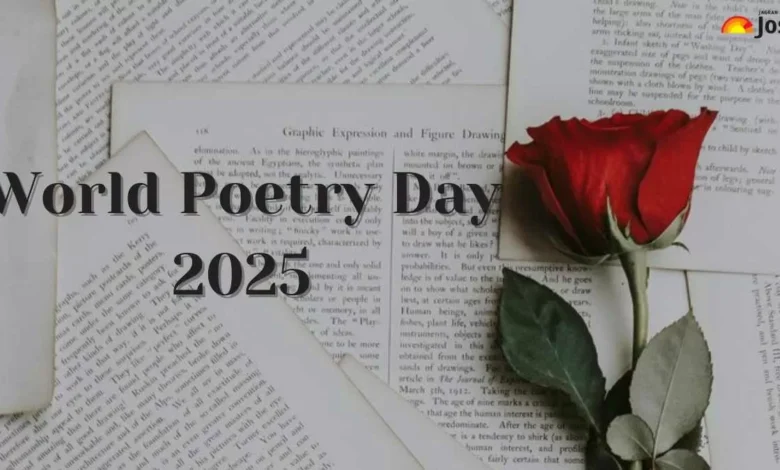World Poetry Day 2025: Poetry as a Bridge for Peace and Inclusion

Every year on March 21, the world unites to celebrate World Poetry Day, a day dedicated to honoring one of humanity’s most profound and timeless forms of artistic and cultural expression. Established by UNESCO in 1999, the day aims to promote the reading, writing, teaching, and appreciation of poetry across the globe. It is a moment to recognize poetry’s unique ability to transcend borders, unite diverse cultures, and express the deepest human emotions.
For World Poetry Day 2025, the theme is “Poetry as a Bridge for Peace and Inclusion.” This theme underscores poetry’s transformative power to foster harmony, celebrate diversity, and give a voice to underrepresented communities. In a world often divided by conflict and inequality, poetry serves as a universal language that connects hearts, sparks empathy, and drives social change.
What is Poetry?
Poetry is more than just words arranged in rhythm and rhyme; it is the soul’s voice, an echo of human experiences, and an art form that captures the essence of life. Whether in the form of sonnets, haikus, spoken-word performances, or epic narratives, poetry has been a vital force in literature and communication for centuries. It expresses love, sorrow, hope, resistance, and triumph, offering a creative medium to explore emotions and perspectives.
Historically, poetry has been a cornerstone of oral traditions, carrying the histories and wisdom of civilizations through generations. From Homer’s Odyssey to Shakespeare’s sonnets, from Rumi’s mystical verses to Maya Angelou’s empowering words, poetry has shaped societies and inspired movements. Today, it continues to evolve through slam poetry, digital poetry, and contemporary spoken-word performances, proving its timeless relevance.
The Significance of World Poetry Day
World Poetry Day is a celebration of language, creativity, and cultural heritage. It serves multiple significant purposes, including:
1. Promoting Linguistic Diversity
Poetry honors the beauty of different languages and helps preserve those that are endangered or marginalized. Many indigenous communities use poetry to protect their cultural identity and history.
2. Encouraging Cultural Exchange
Through poetry, people gain insight into different cultures, perspectives, and traditions. Reading poems from different backgrounds fosters mutual understanding and respect.
3. Inspiring Creativity
Poetry encourages individuals to think, imagine, and express themselves creatively. It pushes boundaries, allowing poets and readers alike to explore new ideas and emotions.
4. Bridging Social and Cultural Divides
Poetry has been a powerful tool in movements for justice, equality, and freedom. Poets like Pablo Neruda, Langston Hughes, and Warsan Shire have used poetry to highlight social issues and advocate for change.
5. Enriching Education
Introducing poetry in schools helps develop literacy, critical thinking, and artistic expression. It teaches students to appreciate language, structure, and metaphor while also building their confidence in expressing ideas.
The Essence and Importance of Poetry
Poetry plays a fundamental role in personal and societal transformation. Its importance can be seen in various aspects of life:
1. Poetry as a Tool for Healing
Poetry provides an emotional outlet for individuals to process their feelings, whether through writing, reading, or listening. It is often used in therapy, grief counseling, and self-reflection.
2. Poetry in Activism and Social Change
Throughout history, poetry has been a powerful force in social justice movements. It has been used to challenge oppression, give voice to the voiceless, and inspire revolutions.
3. Poetry in Music and Pop Culture
Lyrics in music, rap, and spoken word performances are modern forms of poetry. Artists like Bob Dylan, Tupac Shakur, and Amanda Gorman have demonstrated how poetry influences popular culture.
4. Poetry as a Memory Keeper
Poetry captures the histories, struggles, and triumphs of different communities. It preserves collective memories and ensures that stories are passed down through generations.
Encouraging Children to Embrace Poetry
Instilling a love for poetry in children can enhance their language skills, creativity, and emotional intelligence. Here are some ways to encourage children to explore poetry:
1. Read Poems Aloud
Introduce children to fun, rhythmic, and engaging poems by poets like Shel Silverstein and Dr. Seuss. Reading poetry aloud helps children develop a love for rhythm and language.
2. Encourage Creative Writing
Give children writing prompts to help them create their own poems. This boosts self-expression, confidence, and imagination.
3. Make Poetry Interactive
Use activities like poetry games, blackout poetry, and rhyming challenges to make poetry fun and engaging.
4. Introduce Spoken Word Poetry
Spoken word and performance poetry allow children to express their emotions and experiences in a dynamic way. Encourage them to recite, perform, or even record their poems.
5. Create a Poetry Journal
Encourage children to keep a poetry journal where they can write their thoughts, observations, and experiences in poetic form.
Activities to Celebrate World Poetry Day 2025
There are many ways to participate in World Poetry Day and celebrate the beauty of words. Here are some ideas:
1. Host a Poetry Reading Event
Gather friends, family, or colleagues for a poetry night where participants can recite their favorite poems or original compositions.
2. Participate in a Poetry Writing Challenge
Encourage people to write a poem based on a given theme and share it on social media using #WorldPoetryDay2025.
3. Organize a Spoken-Word Poetry Slam
Host a spoken-word event where poets can perform their work with passion and expression.
4. Explore Poetry from Different Cultures
Read poetry from different countries and languages to appreciate diverse storytelling styles and emotions.
5. Create a Poetry Wall in Schools and Workplaces
Set up a space where people can write, share, and pin their favorite poems.
6. Write a Poem for Someone Special
Surprise a loved one with a heartfelt poem expressing gratitude, admiration, or love.
7. Use Blackout Poetry Art
Take an old book page or newspaper and create a unique poem by blacking out certain words.
8. Organize a Poetry Contest
Encourage students, writers, and poetry lovers to submit their best works for a poetry competition.
9. Watch Poetry Films and Documentaries
Explore films and documentaries on poetry and famous poets to gain a deeper understanding of their work.
10. Support Local Poets
Buy poetry books from independent authors, share their work, or attend book signings and poetry readings.
Conclusion
Poetry has the power to move, heal, and inspire. On World Poetry Day 2025, let us celebrate this timeless art form by writing, reading, and sharing poetry. Whether through a classic sonnet, a heartfelt haiku, or a powerful spoken-word piece, poetry connects us all. Let’s use poetry as a bridge for peace, inclusion, and unity—because in the words of the poet Rainer Maria Rilke, “If your daily life seems poor, do not blame it; blame yourself that you are not poet enough to call forth its riches.”





